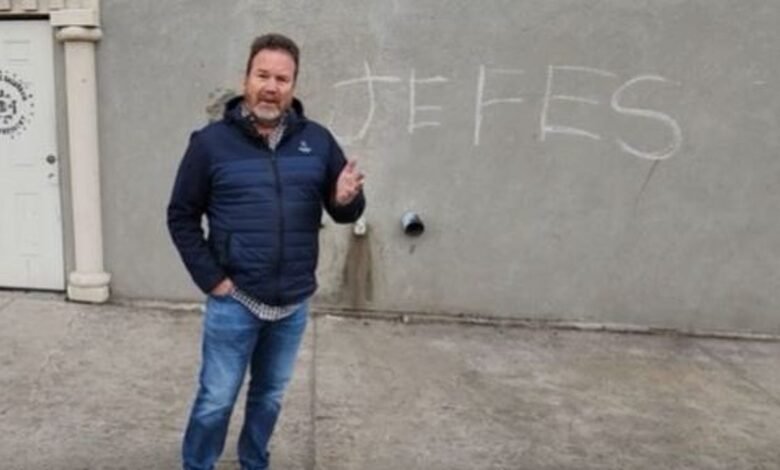Washoe board drops Reno 4th St. property value by 10% due to homeless

Businessman Eddie Lorton won a 10% decrease in the value of his East Fourth Street property after making the case that it was worth less because of homelessness.
He hopes the Washoe County Board of Equalization’s decision leads to two outcomes: Nearby property owners receive a similar devaluation, and the city of Reno is inspired to provide better law enforcement and maintenance in the East Fourth Street area.
“Something has to be done with the homeless,” he said at the board’s Feb. 28 meeting. “It’s hard to do business, hard to maintain tenants and the maintenance is through the roof.”
Lorton said he’s had to paint over graffiti, fix doors and windows smashed in by thieves, and clean up encampments behind his warehouse that houses a nightclub.
“I did this is to help everybody,” Lorton told the RGJ of his effort to make city officials acknowledge the detrimental effect of homelessness on downtown businesses. He’s run for Reno mayor three times.
“Someone had to do something. If they’re losing (tax) revenue, maybe they’ll do something. I would love nothing more than for Fourth Street to be cleaned up and prosperous.”
Taxes up, not down
While Lorton received a 10% devaluation – less than the 25% he requested – the decision did not lower his property taxes.
In fact, they will go up 8%, Washoe County Assessor Chris Sarman told the RGJ by email.
“The reduction was not given in the form of taxes,” Sarman said, noting that the equalization board and the assessor’s office do not address taxes. “Mr. Lorton won’t be seeing savings in his property tax.”
During the equalization meeting, board member Eugenia Bonnenfant said she would support a 10% drop in Lorton’s taxable property value.
“It would be purely symbolic as a recognition that the issue exists,” she said, referring to homelessness’ effect on property values.
Lorton accused the county of spinning the issue by saying his taxes were increasing, to distract from a hit to government revenue.
“No matter how much they raised (the property’s taxes), I’m paying 10% less than I would have on the land,” he told the RGJ. “They’re trying to minimize it.”
Sarman said Nevada has a tax cap to prevent economic hardship for property owners when property values rise. If a property is one’s primary residence, taxes can’t rise more than 3% in a year. For other properties, they can’t rise more than 8%.
This can create a gap between a property’s taxable value and the amount that’s capped for actual tax purposes. In such cases, the property’s value can be decreased yet still have enough room above the capped value for its taxes to be raised 8%.
“In this case,” Sarman said of Lorton’s property, “that is the situation.”
Other property owners affected
Lorton showed the equalization board videos he had made of property owners talking about the effects of homelessness.
“It’s very common for us to come to work in the morning and have to clean up garbage,” said Jack Bassett, owner of D Bar M Western Store.
“We have to move people that are camped in our parking lot, on our sidewalk. We have to clean up feces, needles, all kinds of drug paraphernalia.”
He said customers are intimidated by people asking for money and dealing drugs nearby.
“It’s like watching a circus every day,” Bassett said. “It’s a pretty sad situation.”
Drew Ribar of A&A Towing said his family has been in business on Fourth Street since 1983, but he’s moving.
“The city of Reno, I think, has stopped enforcing laws,” he said. “My business is broken into just about every other day.”
He said he’s lost six figures in stolen property and equipment repairs.
“People come onto the lot and I find them sleeping here in the morning,” Ribar said. “They’re fighting, screaming, yelling like zombies walking up and down the road. … I’m running a business, and I’ve got choices to make.”
Officials recognize problem
Howard Stockton of the Washoe County assessor’s office said it was heartbreaking to see the photos Lorton shared of problems on East Fourth Street.
“There’s no doubt that this area is suffering from a detriment,” he said. “If you go up to the other side – to West Fourth Street – our baseline (property) values are significantly higher.”
Assessor Sarman said East Fourth Street’s property values are “suppressed” compared with surrounding areas such as Midtown and West Fourth.
“Take a drive down East Fourth Street and I believe most folks would agree that the homeless situation along it is a serious one,” he told the RGJ.
“I strongly believe the impact does affect the value of property, the value of business and the desire to invest.”
He said this is unfortunate for long-time property owners, those who pay fees and taxes to the Business Improvement District expecting improvements, and people who are hesitant to invest in the area.
“It could become a great area if revitalized in time, and I hope it will become that way sooner than later,” Sarman said.
In the end, the equalization board – which decides on appeals of property valuation – reduced the land value of Lorton’s property by $9,425, to $302,111.
“This reduction is based on perceived detriments in the community,” according to the language approved by the board of equalization.
No automatic reduction for other property owners
Although Lorton had hoped the board’s decision would mean automatic reductions for his neighbors, the board’s decision only took into account his parcel.
“We were not directed to adjust the land values of neighboring properties,” Sarman said.
“However, it must certainly be noted that it is our mission to be fair and equitable, and through that mission, we will be sure to review values in that area again next fiscal year during our reappraisal.”
Each year, the assessor’s office adjusts property values based on a wide range of data, including traffic and how much nearby properties sell for.
“Every year we have new data available, and we’ll follow that data to a conclusion at that time,” Sarman said. “Values may go up, remain stable or even decrease if the data illustrates that.”
Teaching a lesson
Lorton wants the city of Reno and the Downtown Reno Partnership, which runs the nonprofit Business Improvement District, to take notice that the board’s decision confirms businesses are being hurt by homelessness.
“This is their lesson learned,” he said. “It sets a precedent for what’s going to happen if they don’t clean it up.”
Downtown businesses pay fees to the Business Improvement District in exchange for keeping the area clean and safe.
“The amount goes up every year, and we’re getting nothing for it,” Lorton said.
The equalization board decision shows that more needs to be done to support East Fourth Street so property values don’t keep falling and investors come back, he said.
“Are you going to pay top dollar,” Lorton said, “when there’s homeless camping in your doorway?”
Mark Robison is the state politics reporter for the Reno Gazette Journal, with occasional forays into other topics. Email comments to mrobison@rgj.com or comment on Mark’s Greater Reno Facebook page.
Source link





